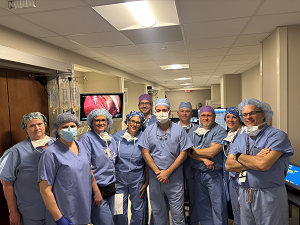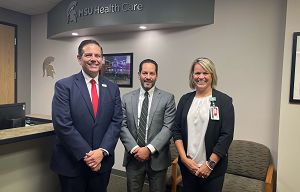Study: Better Fitness Can Reduce Severity of COVID-19

FOR IMMEDIATE RELEASE
Henry Ford Health System Researchers Find Those More Aerobically Fit Are Hospitalized Less Due to COVID-19
DETROIT – Those in better aerobic shape are less likely to be hospitalized due to COVID-19, according to a new study published by researchers at Henry Ford Health System.
This study, published with video and an editorial in the January issue of Mayo Clinic Proceedings, is one of the first studies to report an association between aerobic fitness – fitness of the heart and lungs – and COVID-19 hospitalization risk.
“This is one more reason to take that walk or get on the exercise bike,” said lead researcher and clinical exercise physiologist Clinton Brawner, PhD, Senior Bioscientific Medical Staff in Preventive Cardiology at Henry Ford Hospital in Detroit. “It adds to the current understanding that exercise and good fitness levels are related to a lower risk of upper respiratory tract infections like COVID-19 and suggests that people may generally tolerate this infection better if they are more fit.”
The systemic inflammatory response to viral infections like COVID-19 has a significant effect on the heart and lungs, or cardiopulmonary system. Aerobic-type exercise training, such as walking or jogging, increases a person’s cardiopulmonary fitness and improves immune function, both of which play an important role in reducing the negative effects associated with respiratory infections, the Henry Ford researchers point out.
The Henry Ford study looked at more than 18,000 patients who underwent an exercise stress test on a treadmill between January 2016 and February 29, 2020. Of those patients, 1181 were tested for the COVID-19 virus between February 29, 2020 and May 31,2020. And 246 (21%) of those patients tested positive for the virus that causes COVID-19; 89 (36%) ended up being hospitalized due to COVID-19.
The researchers then looked at the difference in aerobic fitness between those COVID-positive patients who were eventually hospitalized and those who were not. They measured fitness levels using “metabolic equivalents of task,” or METs, the standard measurement of aerobic fitness used during stress tests. One MET is the amount of energy used at seated rest. Walking at 3 miles per hour (mph) equals about 3.5 METs. The researchers found those who were hospitalized had a lower fitness than those who were not hospitalized. In their study, each 1 MET higher peak fitness was associated with a 13% lower risk of hospitalization from COVID-19.
“The take-home message from our study is higher fitness is related to a lower risk of hospitalization from COVID-19,” said study co-author Jonathan Ehrman, PhD., associate program director of Preventive Cardiology at Henry Ford Hospital in Detroit. “Our data suggests that striving to achieve a peak fitness level of at least 7.5 METS –equivalent to slow jogging—might be a good goal for our patients and general population to achieve a lower risk of hospitalization due to COVID-19.”
The current public health recommendation is to exercise and perform at least 150 minutes of moderate intensity exercise per week, or 75 minutes of vigorous intensity exercise per week, or a mix of both.
“Unfortunately, low fitness seems to be an enduring risk factor for most patients, similar to hypertension and diabetes,” Dr. Ehrman said. “Many people do not move to a higher fitness level during the rest of their lifetime, despite understanding that they have low fitness and the importance of having a higher fitness level. However, if they improve their fitness, there are many studies that show that their health will improve, including lowering their risk of heart disease, certain cancers, diabetes and other chronic diseases. And it’s likely that this benefit from improved fitness now likely includes lessening the risk of complications due to COVID-19.”
High blood pressure, smoking and diabetes have the greatest impact on health in the United States, he added. But the risk factors of lower fitness, lack of regular exercise and obesity likely affect more people than any other modifiable risk factor. Performing regular exercise and physical activity and, if needed, losing weight are really the only ways to improve one’s fitness.
###
About Henry Ford Health System
Founded in 1915 by Henry Ford himself, Henry Ford Health System is a non-profit, integrated health system committed to improving people’s lives through excellence in the science and art of healthcare and healing. Henry Ford Health System includes six hospitals including Henry Ford Hospital in Detroit; Henry Ford Macomb Hospitals; Henry Ford Wyandotte Hospital; Henry Ford West Bloomfield Hospital; Henry Ford Allegiance in Jackson, MI; and Henry Ford Kingswood Hospital – an inpatient psychiatric hospital. Henry Ford Health System also includes Henry Ford Medical Group: Henry Ford Physician Network; more than 250 outpatient facilities; Henry Ford Pharmacy; Henry Ford OptimEyes; and other healthcare services. Our not-for-profit health plan, Health Alliance Plan – HAP – provides health coverage for more than 540,000 people. As one of the nation’s leading academic medical centers, Henry Ford Health System trains more than 3,000 medical students, residents, and fellows annually in more than 50 accredited programs, and has trained nearly 40% of the state’s physicians. Our dedication to education and research is supported by nearly $100 million in annual grants from the National Institutes of Health and other public and private foundations. Henry Ford Health System employs more than 33,000 people, including more than 1,600 physicians, more than 6,600 nurses and 5,000 allied health professionals. For more information, go to henryford.com.
###
MEDIA CONTACT: Tammy Battaglia / tbattag1@hfhs.org / 248-881-0809 cell
To view the study, please visit: https://www.mayoclinicproceedings.org/article/S0025-6196(20)31130-7/fulltext
For a video on the study, please visit: https://youtu.be/hnQgxJoiscI
.svg?iar=0&hash=F6049510E33E4E6D8196C26CCC0A64A4)

/hfh-logo-main--white.svg?iar=0&hash=ED491CBFADFB7670FAE94559C98D7798)









